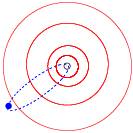 Guys, GUYS, you know I am a huge space geek, right? I was raised on science fiction books, my dad used to tell me star myths, and I have pretty much seen any science fiction movie in existence. So, why did I not know that there were mentions of Halley's Comet in ancient Hellenic writings?
Guys, GUYS, you know I am a huge space geek, right? I was raised on science fiction books, my dad used to tell me star myths, and I have pretty much seen any science fiction movie in existence. So, why did I not know that there were mentions of Halley's Comet in ancient Hellenic writings?Okay, so, astronomy lesson! Halley's Comet is a short-period comet, or periodic comet, meaning it is a comet that has a orbital period of less than 200 years. It is visible from Earth every 75–76 years. Halley is the only short-period comet that is clearly visible to the naked eye from Earth, and the only naked-eye comet that might appear twice in a human lifetime. Halley will make its next pass in 2061, and it has been doing this for many, many, many, years.
Daniel W. Graham and Eric Hintz published about a (possible?) ancient Hellenic sighting of Halley's comet in the Journal of Cosmology, 2010, Vol 9, 2130-2136. In the introduction they say:
"The regularity of the orbits of comet Halley has made possible the determination of its visits backwards in time through the Middle Ages to antiquity. Computer models have provided correlations between reports of comets back to the second and third centuries BC and astronomical records of the Babylonians and Chinese. So far the earliest probable sighting is the return of 240 BC, confirmed by Chinese observers. Thus far ancient Greek records, which do not contain systematic diaries of heavenly events, have not been considered in this connection. One famous event recorded by Greek philosophers and historians is the fall of a meteor in northern Greece in 467/6 BC. At the time of the meteor, a comet was visible. This coincides with the retrodicted appearance of comet Halley in the summer of 466 BC. Using computer models we examine the probable path of comet Halley on that return and find it is consistent with reports about features of the observed comet. The philosopher and scientist Anaxagoras is said to have predicted the fall of the meteor. One ancient source corrects this confusion and allows us to see how the Greeks combined theory and observation in this case."
In the article they go on to list the various accounts, and go into the ancient scientific explanations put forth by the ancient Hellenic greats. In the end they never prove that the comet Anaxagoras of Clazomenae predicted, Daimachos saw, and Aristotle reported on was, in fact, Halley's Comet, but they make a very strong circumstantial case. Enough for me, at least, to get very excited over--because obviously the ancient Hellenes saw this phenomenon, but if they have actually written about it, that solidifies the links from our time to theirs. something like that will always get me excited.

No comments:
Post a Comment